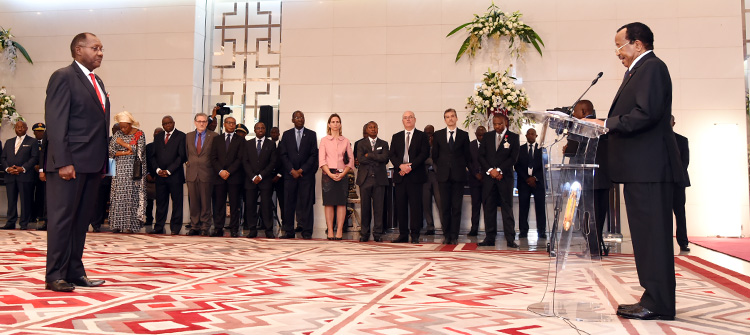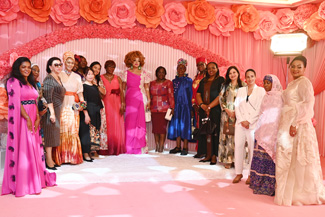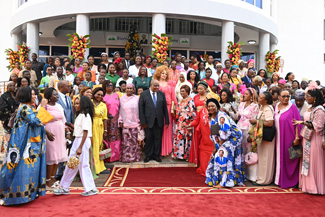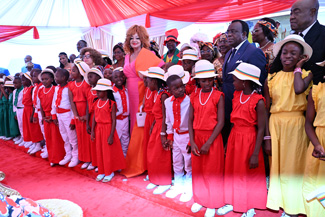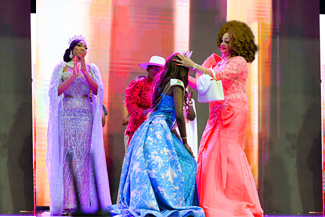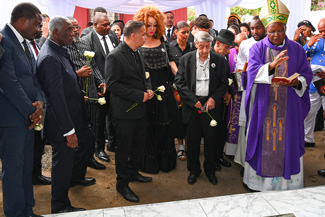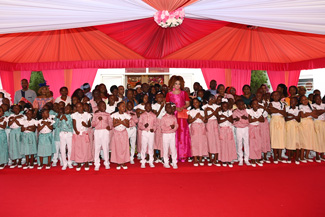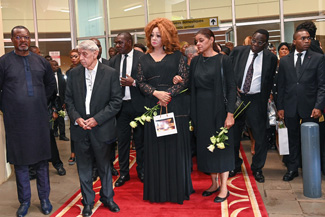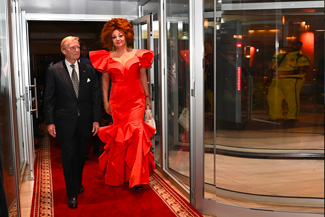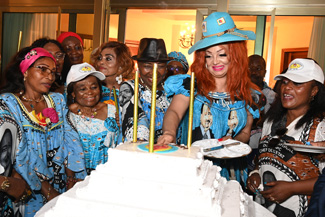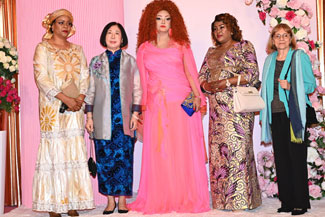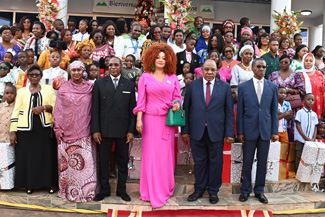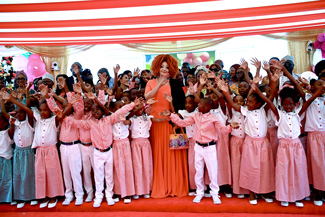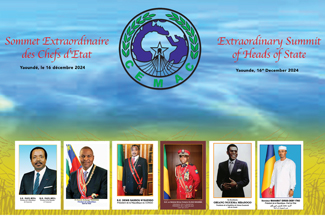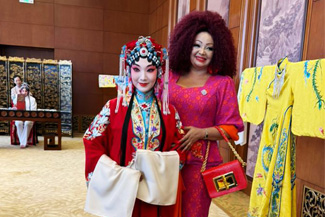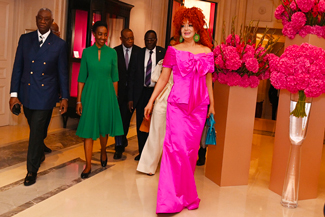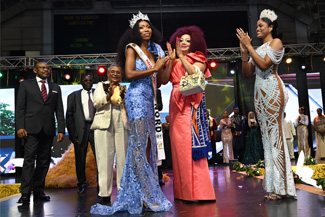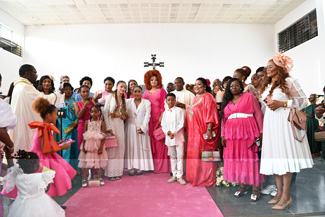The Dean of the Diplomatic Corps,
I would, first of all, like to thank you for your very kind and encouraging words to my wife and I and, above all, to the Cameroonian people whose courage and peace-loving nature you have kindly emphasized.
Distinguished Members of the Diplomatic Corps,
As we receive news of the last battles against the Islamic State in Iraq and Syria and as signs of global economic recovery begin to show, can it be concluded that the tensions of the recent years are easing and that the world is entering a new era that is more conducive to economic and social progress?
It is certainly too early to answer this question. However, nothing prevents us from examining, together, various aspects of the issue thus raised.
Admittedly, the Islamic State seems to have been defeated. However, it has left in its trail latent seeds of insurgency. Moreover, many jihadists have returned to their countries of origin where they are a potential danger.
Similarly, the rivalry between the two most powerful countries in the region will remain a destabilizing factor for the entire region, not to mention the Israeli-Palestinian problem that seems to have dampened every ounce of goodwill and thus remains unresolved. Consequently, the Near and Middle East region is likely to remain a potential conflict area.
By the way, jihadists had already extended their activities to North Africa and the Sahelian strip well before the defeat of the Islamic State. Under such names as AQIM, Boko Haram and al-Shabaab, jihadism has been and remains a threat to various African States. Despite the blows it has been dealt, it is still a source of danger to the independence and social model of those countries.
Concerning Cameroon, the threat has been averted thanks to the bravery of our defence and security forces and the Multinational Joint Task Force supported by the African Union and our international partners.
However, we must remain vigilant. While the United Nations and major world powers have become fully aware of the threat, a global strategy is still to be developed to provide a final solution.
On the economic front, I believe we must salute the signs of a return to growth. However, it should be noted that the situation is not the same everywhere.
Some countries are already experiencing growth, driven by substantial injections of liquidity and very low interest rates, while others, despite a drastic fall in exports, are still recording high growth rates, mainly thanks to strong domestic demand. Some countries are still struggling to get back to growth, while others, like Cameroon, have adopted a structural reform agenda as falling oil and commodity prices have slowed down growth.
In this regard, it is necessary to underscore the importance of the recent CEMAC summits held in Yaounde and N’djamena, which emphasized the need to accelerate sub-regional integration.
The main goal is a return to economic growth. In our case, we will spare no effort within our power to implement the programme and remain focused on our agenda of achieving emergence by 2035.
The very contrasting situation I have just painted makes it rather presumptuous to prejudge the probable outlook of the world’s economy. Growing inequality is fuelling the rise of populism and nationalism.
These phenomena, which can be observed especially in some developed countries, have led to the protectionist and isolationist tendencies that have been gaining ground for some time now. It is obvious that if such phenomena become more widespread, we may witness a veritable regression of trade, with all its attendant negative effects on both developed and developing countries.
Fortunately, we have not yet reached that stage. The most positive outcome would obviously be to hold international negotiations that would seek to find middle ground between protectionism and wanton globalization. It would indeed be desirable to reach a compromise, combining the recognized advantages of globalization with the protection of national interests.
A while ago, I said nationalism was again on the rise in our times. When nationalism is taken to mean love for one’s nation, it is tolerable. But when, as is often the case, nationalism is defined in opposition to other nations, its essence changes and it becomes dangerous. The same is true of regionalism. However, there is a growing trend of centrifugal forces that call the unity of either old or new States into question.
In my opinion, splintering runs in the opposite direction of history. Globalization implies forming groups to promote harmony and solidarity among the members of the human community and ensure their protection. Such is the case with international and regional organizations and, even more so, with States.
As a former mandated and trust territory of the League of Nations and the United Nations respectively, Cameroon is a fervent supporter of our common International Organization and its initiatives to promote peace, development and environmental protection.
Having observed that global warming is persisting and that its effects are becoming increasingly obvious, judging from the frequency of natural disasters, my country, which was one of the first to ratify the Paris Agreement, considers that the commitments made at COP 21 must be honoured. Cameroon supports the efforts made to this end at COP 22 in Marrakech and at COP 23 in Bonn, and most recently in Paris. We must bear in mind that it is the fate of humanity that is at stake.
Speaking specifically of humanity, I would like to express compassion for migrants and refugees, whether fleeing fighting in the Middle East or embarking on perilous adventures from sub-Saharan Africa to Europe in search of a better future. They are locked up in camps, huge sums of money are extorted from them to get a place on makeshift boats, and they are even sold as slaves. Do these people not have the right to be treated as human beings?
At their recent joint summit in Abidjan, the African Union and the European Union charted the way forward. But when will the international community really come together to take action and put an end to what will undoubtedly go down in history as one of the greatest scandals of the 21st century?
As far as Cameroon is concerned, we deployed our diplomatic activities throughout the world.
High-level contacts were made:
with the President of the Italian Republic and His Holiness Pope Francis in Rome,
with CEMAC Heads of State at the N'djamena Summit,
with the United Nations Secretary-General in New York and Yaounde,
with the Heads of State present in Abidjan at the African Union-European Union Summit, and
with Heads of State at the 12 December 2017 One Planet Summit in Paris on financing the Climate Agreement.
From the foregoing, I can confidently say that our country is living up to its billing.
Last but not least, the most recent visit by the Right Honourable Patricia Scotland, Secretary-General of the Commonwealth, was an opportunity for us to show our attachment to that esteemed institution and to brief our august guest on the realities of our country. I must note that her visit to Cameroon at this time of our history was most welcome.
Before concluding, I would like to revisit a point to which I attach some importance. Until recently, it seemed to me that there had been some consensus on the need to seek, as far as possible, acceptable solutions to disputes between powers and to problems that put the interests of the international community as a whole at stake. In this respect, I seemed to see some degree of mutual trust among a majority of States.
However, I have the impression that things have changed somewhat and that the spirit of consensus has waned. Opposition is more radical and the quest for compromise is less present. Yet, since 1945, the world has experienced the longest period of widespread peace in modern history. Hunger, poverty and epidemics have reduced. Exclusion is no longer a fatality. Obviously, there is still a lot to do. That is why it is absolutely necessary to secure renewed trust between nations and for the spirit of conciliation to take its rightful place.
The Dean of the Diplomatic Corps,
Distinguished Members of the Diplomatic Corps,
I would now like to request you to kindly convey our best wishes for the New Year to the distinguished authorities that you represent here.
I extend to you and your families my most sincere wishes for happiness, health and success in 2018.
Long live international cooperation!
Thank you for your kind attention.
Yaounde, 4 January 2018
Download the speech (pdf)
